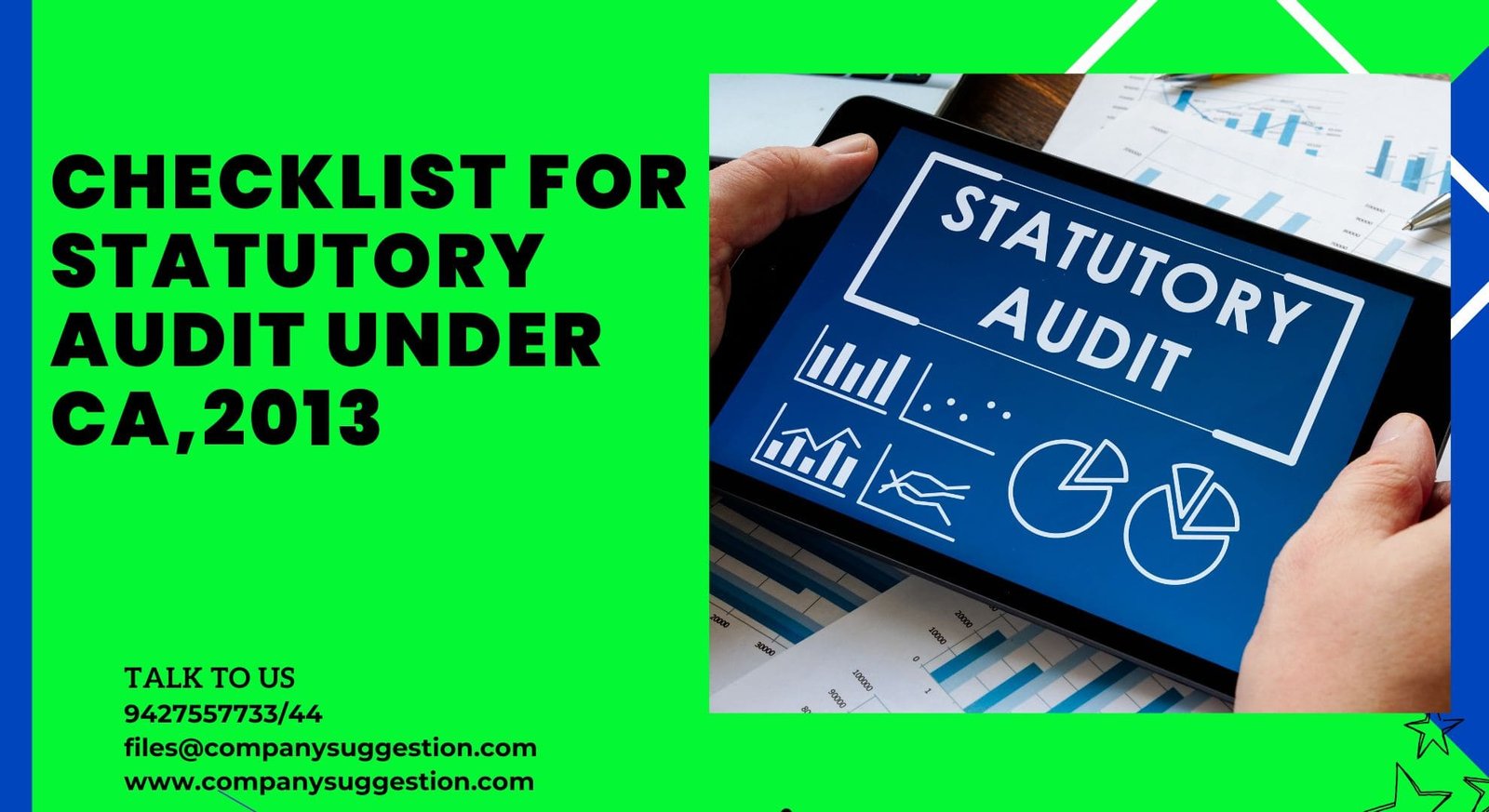Checklist for Statutory Audit
Every company, no matter how large or small, has to get a statutory audit once every year. It is not just about following the rules it also a way to make sure that the financial statements truly shows how a business is performing and where it stands financially. The Companies Act, 2013 lays down the legal framework for statutory audits in India. For directors, auditors, and finance professionals, having a practical checklist makes the whole process smoother and ensure nothing skip through the cracks.
In this blog, we will break down the statutory audit checklist in simple, human language so that you can easily understand what needs to be done and why.
1. Appointment of Auditor
The very first step in an audit is making sure the company has a properly appointed auditor. According to the Companies Act, the first auditor must be appointed within 30 days of incorporation by the Board of Directors, after those shareholders in the Annual General Meeting for a term of five years by filing form ADT-1.
Before the audit begins, the auditor must:
- Check that Form ADT-1 has been filed with the Registrar of Companies.
- Gets a written confirmation from the auditors that they are eligibility certificate from the auditor confirming that there is no disqualification under the Act.
This step is often overlooked, but if the auditor is not duly appointed, the entire audit process may be challenged later.
2. Understanding the Company and its Operations
An audit is not only about verifying numbers, it start with the auditor first needs to understand how the company actually works.
This includes:
- Reviewing the Memorandum and Articles of Association to understand the company’s legal firm.
- Studies the industry in which the company operate its size and overall business environment
- Look into internal policies such as accounting guideline, HR policies, and compliance system.
This background check helps the auditor plan the audit approach effectively that suits the company specific needs.
3. Examination of Books of Accounts
Every Company must, by law keep proper books of accounts at its registered office. When doing audit, the auditor makes sure that:
- Records like cash books, ledgers, journals, and bill are properly maintain.
- Account is prepared using the accrual method and follows the double-entry system.
- Financial report such as Balance Sheet, Profit & Loss Account, and Cash Flow Statements are prepared in the format required by Schedule III of the Companies Act.
4. Verification of Statutory Registers
Apart from accounts, company is also required to oversee a set of statutory registers. The auditor has to check if these registers are accurate and properly maintained:
- Register of Members.
- Register of Directors and Key Managerial Personnel
- Register of Charges
- Register of Loans, Investments, and Guarantees
- Register of Contracts with Related Parties
In many private companies, this is where non-compliance is found, as these registers are often neglected.
5. Checking Board Meetings and General Meetings
The Companies Act requires holding some meetings to be held with proper and well documentation and in arrange manner.
The auditor ensures that:
- The company has held the minimum number of Board Meeting during the year.
- Proper Notices, agendas, and minutes of these meetings are maintained as per legal required.
- Annual General Meeting (AGM) where applicable has been conducted on time.
The auditor also review whether important matters like borrowing, related party transactions, and appointment of directors.
6. Verification of Share Capital and Loans
The auditor reviews the company share capital records to ensure that:
- Necessary approval from the board of Shareholder has been obtained.
- Allotments are properly supported with the Registrar. Any buyback or transfer of shares has been carried out legally.
Similarly, for loans and borrowings:
- Board and shareholder approvals have been taken wherever necessary.
- The company has complied with Section 185 and 186 relating to loans and investments.
- Repayment schedules and interest provisions are properly recorded.
7. Checking Compliance with Accounting Standards
The Companies Act makes it mandatory companies to follow prescribed accounting standard. During the audit check weather
- The Standards notified under Section 133 have been applied consistently.
- All necessary Disclosures are properly made in notes to accounts.
- Any deviations from standards are properly explained is reported along with reasons.
This ensures uniformity and comparability of financial statements across companies.
8. Examination of Internal Controls
An important part of statutory audit is to check whether the company has adequate internal controls. This includes:
- Segregation of duties among employees.
- Proper authorization for expenses and capital expenditures.
- Physical verification of fixed assets and inventory.
- IT controls for safeguarding data.
Weak internal controls often lead to frauds or misstatements.
9. Verification of Statutory Dues
Every company has to follow the law of deducting and paying thinks like GST, TDS, PF, ESI, and Professional Tax. The auditor job is to make sure the company is doing this properly. They check whether:
- All taxes are being deducted and deposited on time.
- The companies are filling tax Returns are filed with authorities.
- Outstanding dues, if any, are disclosed properly.
Non-payment of statutory dues can result in heavy penalties and even disqualification of directors.
10. Review of Related Party Transactions
Related party transactions are always under the scanner because they may lead to conflict of interest. The auditor checks:
- The company has clearly identify All related parties are identified and disclosed.
- The Necessary approvals have been obtained from the Board or shareholders.
- Transactions are at arm’s length and recorded in the register.
If this transition is not properly, disclosed, the company could face strict penalties.
11. Review of Financial Statements
The auditor’s main responsibility is to examine whether the financial statements give a true and fair view. Key points include:
- Make sure items on the Balance Sheet items like assets, liabilities, provisions, and reserves are correctly valued.
- Verifying the Profit and Loss account reflects the real income and expenses
- Checking that the Cash Flow Statement is prepared as per prescribed format.
- Ensure the Notes to accounts disclose all significant information.
12. CARO (if applicable)
The Companies (Auditor’s Report) Order, known as CARO, applies to certain classes of companies. Under CARO, the auditor has to report on specific matters like:
- Proper maintenance of records.
- Physical verification of inventory.
- Default in repayment of loans.
- Fraud reporting.
This is an additional reporting requirement apart from the main audit report.
13. Management Representations
At the end of the audit, the auditor obtains a written representation from management confirming that:
- All information has been provided.
- There are no undisclosed transactions.
- The company has complied with laws and regulations.
This helps safeguard the auditor in case of any later disputes.
14. Audit Report
Finally, the auditor prepares and signs the audit report. This report is presented to the shareholders in the Annual General Meeting. The report should clearly state whether the financial statements present a true and fair view and should also highlight any qualifications or adverse remarks.
Conclusion
A statutory audit is much more than just number crunching. It is about checking the overall compliance of a company with the provisions of the Companies Act and other applicable laws. For directors, it acts as a mirror reflecting whether they are discharging their responsibilities properly. For stakeholders, it builds trust that the company is transparent and accountable.
By following a structured checklist covering appointment of auditors, verification of records, compliance with laws, examination of financial statements, and reporting, the audit process becomes smooth and reliable. A well-conducted audit not only ensures legal compliance but also strengthens the governance framework of the company.
Company Suggestion has the best team of consultancy. Our consultants are not just advisors but partners invested in your long-term success. We provide actionable insights and practical recommendations, empowering you to make informed decisions. Transparency, integrity, and continuous improvement are the cornerstones of our practice.
If you have any doubt regarding this, then you can send your doubts on company suggestion and our team of experts will guide you.













